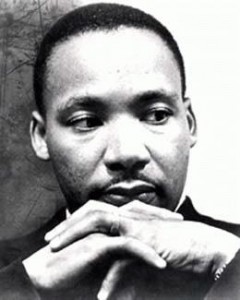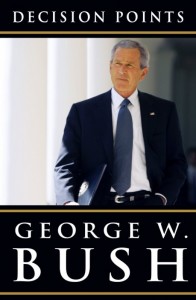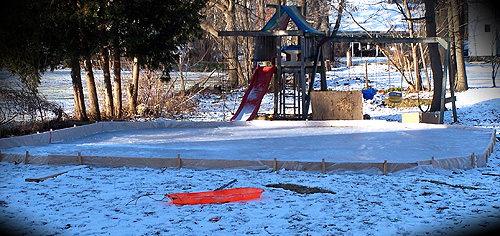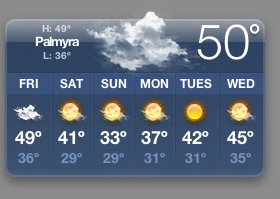Men often hate each other because they fear each other; they fear each other because they do not know each other; they do not know each other because they can not communicate; they can not communicate because they are separated. —Dr. Martin Luther King, Jr.
I’ve been meaning to write this post many times over. It’s changed from time to time, focusing on one particular story or detail or another. But the core of it has remained the same: we are really not listening to each other.
Worse yet, we aren’t even trying. Worse still, we might not even know how!
 The quote above is from a book I am reading written by Dr. King about his years in Montgomery, Alabama—the heart of the “Deep South”. And since today is Martin Luther King, Jr. Day… it seemed the perfect time to write out these thoughts!
The quote above is from a book I am reading written by Dr. King about his years in Montgomery, Alabama—the heart of the “Deep South”. And since today is Martin Luther King, Jr. Day… it seemed the perfect time to write out these thoughts!
Incredibly, in the 1950s—nearly 100 years after the Emancipation Proclamation, and almost 150 years since the slave trade had been abolished (see here and here)—the people of Montgomery still lived as two very separate groups of people.
You’ve heard the stories. “Whites” and “Negroes” or “Coloreds” were separated on buses, restaurants, drinking fountains, even churches. Montgomery was one of the more segregated cities in America.
Feeling like this was his home (the South), the current state of race relations understandably troubled King very much. Enough that he did something about it.
So much that he has his own holiday.
But one of the things he did was not political, nor legislative, nor even “activist”.
He just got people together.
He said in his book, early in the story, that one certain committee of people—the Montgomery Council—was vital to the health of his city, Montgomery, because it was the only place where both sides who were (more than) very polarized were actually together in the same room. Otherwise, there was no communication at all.
And when there’s no communication, there’s no understanding, and that leads to fear and hate as King said.
Isn’t that where we are today? It’s mostly not race-related*. (Though that reality certainly persists, even if lessened, and will to the end of time.) Today our divisions are social, political, idealogical. But they are just as divisive, and we are just as un-hearing of the “other” side. We are still “separated”.
Those of us who read the Huffington Post already know what the rest who get their news from The Blaze or Fox News think, and even what they will do. Those of us who vote Republican and identify with the Tea Party may have a bit more tolerance for other opinions (due to a love for individual freedoms), but often know with certitude what the CNN/MSNBC crowd think, and again, what they “will do”.
And so the incessant banter continues, without either side listening much past the first thing they think they heard the other side say.
We’ve gotta be in the same room. If not physically, then at least in spirit.
It is extremely rare to find anyone who is truly open enough to sit in the same room with a person who has equally deep convictions on any given subject or subjects, just in the opposing camp. We tend to congregate with people of like mind. And that can certainly be good, helpful, encouraging in a way, but it is most certainly not helpful towards a more united community, local or on a larger scale.
And so we continue in hate, produced by fear, produced by lack of knowledge, produced by a lack of communication (meaning when both sides are spoken, and heard) …
And we get nowhere. Only further apart. More polarized. Less of a Union.
An interesting piece for a future post is that when we were first forming our Constitution, one of the arguments for the forming of a stronger union was that the larger and more diverse the Union, the less power would be given to factions of any sort. Factions were defined as homogenous groups of people united on the things they hold in common (in contrast to other people or groups of people). So if the Union was comprised of people from all classes, faiths, backgrounds, cultures, etc, then no one group could ever get a majority power of any other minority group. (And again, I’m not mainly talking “races”.)
But in the end, we have to listen to each other. Really listen. (I’ve been talking about this for a while. Re-read this article when you can, along with the links within to two other articles.)
And finally, more than just listen… we need to do. That was what set MLK apart. He acted on his beliefs and convictions.
And the world was changed.
If you want some more reading for MLK Jr. Day, please check out my post from last year, or find a copy of Stride Towards Freedom somewhere. Or I’m also reading The Life and Death of Martin Luther King, Jr (though definitely not far enough in to recommend it, or not recommend), and you can just read his own words in his speeches online!
He was a great man of conviction, courage, principles, and above all he loved God and the people he made, regardless of skin color, or anything else external. He fought for that dream, and paid for that deep conviction with his life.
No greater love than this… to lay down his life for a friend.
His love for others brought people together, an we are better for it today.
Note: I agree with Ken Ham from Answers in Genesis who contends that there are no races… we are all one race. Since God made us all from two people, that would seem to follow. But this article is most certainly NOT about creationism! 🙂


 Since the beginning of time, young kids have seen the colored tiles—whatever shape they might assume—as an endless playground for the imagination, and an exciting test of their balance and coordination skills.
Since the beginning of time, young kids have seen the colored tiles—whatever shape they might assume—as an endless playground for the imagination, and an exciting test of their balance and coordination skills.




 Being one who has loved writing for as much of his life as he can remember, you’d think that the basics of grammar and punctuation would be the proverbial “old hat” by now, right? Well, sadly, I must admit to a(n incorrect) habit that I just CAN NOT break.
Being one who has loved writing for as much of his life as he can remember, you’d think that the basics of grammar and punctuation would be the proverbial “old hat” by now, right? Well, sadly, I must admit to a(n incorrect) habit that I just CAN NOT break.
 Check out the forecast: 50º right now, and not a freezing temp in sight!
Check out the forecast: 50º right now, and not a freezing temp in sight!